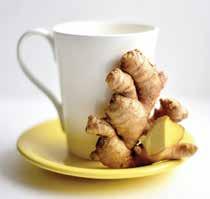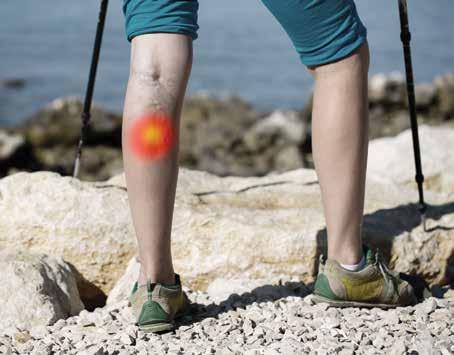
2 minute read
Dear Pharmacist: Improve memory and reduce pain with ginger
from February 2021
Improve memory and reduce pain with ginger
Ginger is something you’ve probably walked past a thousand times in the grocery store and passed up. While ginger is often thought of as a flavoring agent, it also has some incredible medicinal benefits and offers people a natural approach to many ailments.
For example, ginger is an antioxidant and strong analgesic (pain reliever). In studies with people who ate dried ginger spice in their meals, 75 percent experienced relief from arthritic pain and swelling! Many women also use ginger for morning sickness during pregnancy. But, it can thin the blood, so avoid or minimize it if you are on anticoagulant medications.
Known officially as Zingiber officinale, ginger contains many therapeutic compounds, all of which have well-documented medicinal actions in the body. Sometimes you have to heat the ginger to see a specific compound. For example, zingerone is negligible in fresh ginger, however, cooking it transforms the gingerol to zingerone. The dried (powdered) ginger spice also contains zingerone in it.
Zingerone is well researched, and it’s incredible. Studies have determined that it reduces inflammation, improves blood sugar, eases muscle pain and spasms, helps with arthritis, speeds fat breakdown and ramps up immune function. In an animal study, ginger compounds protected rodents from brain damage and memory loss. As a result, drug companies are now trying to morph it and patent it into an Alzheimer’s drug. I say, just eat it!
Ginger can block your enzyme xanthine oxidase—which is good because that reduces ROS (reactive oxygen species). So, the fact that ginger can degrade these ROS free radicals means it protects your DNA and mitochondria. In fact, ginger promotes mitochondrial health, which stores energy for you in the form of ATP.
If you have liver disease or hepatic injury (for example, hepatitis), consider ginger in all of your recipes because studies show that zingerone has a hepatoprotective effect.
Additionally, ginger might have some heavy metal binding abilities because it can reduce cadmium levels, according to animal studies. It can also reduce the body’s burden of organophosphate pesticides (Unfortunately, it cannot bind gadolinium from MRIs). If you have a PON1 gene, make ginger your friend!
Not only does ginger spice up your recipes, but it also makes for a quick and delicious tea. I have a recipe for this on my website, as well as a free ebook called “Spices that Heal.” Ginger is a delicious, safe and affordable way to improve health while adding a warming spice to your meals. ■
DEAR PHARMACIST BY SUZY COHEN For more articles and advice, sign up for Suzy’s newsletter at www.SuzyCohen.com
Grand Junction Vein Center
Treating varicose veins, spider veins, and vein problems
Have Tired Achy Legs?

Call Today For Your Vein Screening!
Covered By Insurance In Most Cases 242-VEIN
GJVEIN.COM
Welcome New Provider, Dr. Markewich Board Certified in Pain Medicine by the American Board of Anesthesiology

970-242-0162Now Accepting New Patients No Dr. Referral Needed






